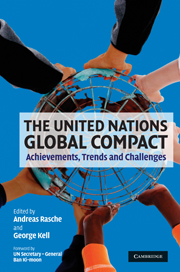Book contents
- Frontmatter
- Contents
- List of figures
- List of tables
- List of boxes
- List of abbreviations
- List of contributors
- Acknowledgements
- Foreword
- Why This Book Matters!
- The Ten Principles of the United Nations Global Compact
- 1 Introduction: the United Nations Global Compact – retrospect and prospect
- Part I Achievements, trends and challenges: reflections on the Principles
- Part II Participants and engagement mechanisms
- Part III Governance and Communication on Progress
- 14 The United Nations Global Compact's governance framework and integrity measures
- 15 The United Nations Global Compact Communication on Progress policy: origins, trends and challenges
- 16 COP reporting in action: the case of Petrobras
- 17 The United Nations Global Compact and the Global Reporting Initiative
- Part IV Local Networks: the emerging global–local link
- Glossary
- Bibliography
- Index
17 - The United Nations Global Compact and the Global Reporting Initiative
Published online by Cambridge University Press: 05 February 2012
- Frontmatter
- Contents
- List of figures
- List of tables
- List of boxes
- List of abbreviations
- List of contributors
- Acknowledgements
- Foreword
- Why This Book Matters!
- The Ten Principles of the United Nations Global Compact
- 1 Introduction: the United Nations Global Compact – retrospect and prospect
- Part I Achievements, trends and challenges: reflections on the Principles
- Part II Participants and engagement mechanisms
- Part III Governance and Communication on Progress
- 14 The United Nations Global Compact's governance framework and integrity measures
- 15 The United Nations Global Compact Communication on Progress policy: origins, trends and challenges
- 16 COP reporting in action: the case of Petrobras
- 17 The United Nations Global Compact and the Global Reporting Initiative
- Part IV Local Networks: the emerging global–local link
- Glossary
- Bibliography
- Index
Summary
The same types of governance gaps and failures that produced the current economic crisis also constitute what the Special Representative has called the permissive environment for corporate wrongdoing in relation to human rights. The necessary solutions for both similarly point in the same direction: Governments adopting policies that induce greater corporate responsibility, and companies adopting strategies reflecting the now inescapable fact that their own long-term prospects are tightly coupled with the well-being of society as a whole.
(Ruggie 2008, extract from paragraph 19)Introduction
In the decade following their launch, the United Nations Global Compact and Global Reporting Initiative (GRI) have developed into two of the most widely used global instruments to promote more responsible business practices in the field of sustainable development. Despite their different histories and organizational structures, their strategic positioning as a mutually reinforcing ‘value platform’ appears to have been successful. Separately, they have achieved pre-eminence in their respective fields. Together, they are increasingly widely used by companies to report their corporate responsibility goals, policies and performance.
Looking ahead over the next decade, however, it is clear they will not achieve their respective missions without directly addressing a range of criticisms. These include that they are neither broad enough in terms of users, nor deep enough in terms of measurable impacts and accountability. There are also issues about the sustainability of their respective business models. In many respects, however, their shortfalls are not of their own making.
- Type
- Chapter
- Information
- The United Nations Global CompactAchievements, Trends and Challenges, pp. 293 - 314Publisher: Cambridge University PressPrint publication year: 2010
- 2
- Cited by

